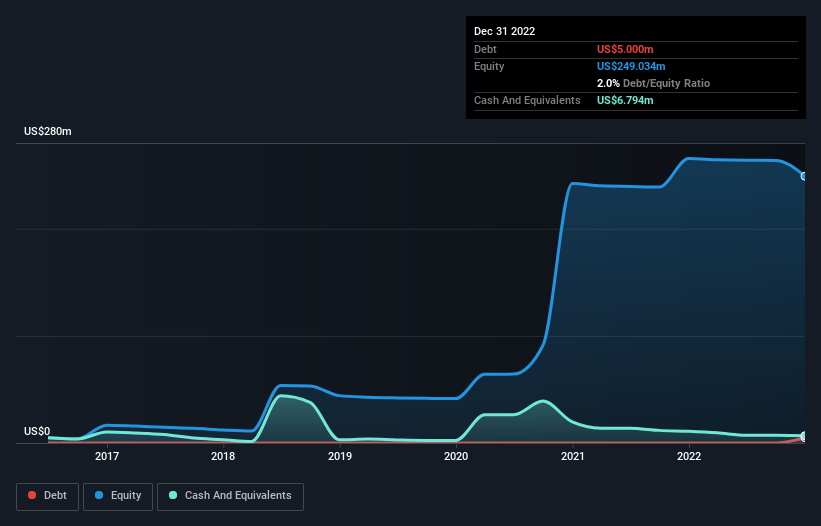
The external fund manager backed by Berkshire Hathaway's Charlie Munger, Li Lu, makes no bones about it when he says 'The biggest investment risk is not the volatility of prices, but whether you will suffer a permanent loss of capital.' When we think about how risky a company is, we always like to look at its use of debt, since debt overload can lead to ruin. As with many other companies Africa Energy Corp. (CVE:AFE) makes use of debt. But should shareholders be worried about its use of debt?
When Is Debt A Problem?
Debt and other liabilities become risky for a business when it cannot easily fulfill those obligations, either with free cash flow or by raising capital at an attractive price. Ultimately, if the company can't fulfill its legal obligations to repay debt, shareholders could walk away with nothing. However, a more frequent (but still costly) occurrence is where a company must issue shares at bargain-basement prices, permanently diluting shareholders, just to shore up its balance sheet. Of course, debt can be an important tool in businesses, particularly capital heavy businesses. When we examine debt levels, we first consider both cash and debt levels, together.
Check out our latest analysis for Africa Energy
What Is Africa Energy's Net Debt?
You can click the graphic below for the historical numbers, but it shows that as of December 2022 Africa Energy had US$5.00m of debt, an increase on none, over one year. But on the other hand it also has US$6.79m in cash, leading to a US$1.79m net cash position.

How Strong Is Africa Energy's Balance Sheet?
According to the last reported balance sheet, Africa Energy had liabilities of US$3.39m due within 12 months, and liabilities of US$5.00m due beyond 12 months. Offsetting this, it had US$6.79m in cash and US$344.0k in receivables that were due within 12 months. So its liabilities outweigh the sum of its cash and (near-term) receivables by US$1.25m.
This state of affairs indicates that Africa Energy's balance sheet looks quite solid, as its total liabilities are just about equal to its liquid assets. So it's very unlikely that the US$167.8m company is short on cash, but still worth keeping an eye on the balance sheet. While it does have liabilities worth noting, Africa Energy also has more cash than debt, so we're pretty confident it can manage its debt safely. The balance sheet is clearly the area to focus on when you are analysing debt. But ultimately the future profitability of the business will decide if Africa Energy can strengthen its balance sheet over time. So if you want to see what the professionals think, you might find this free report on analyst profit forecasts to be interesting.
Given its lack of meaningful operating revenue, Africa Energy shareholders no doubt hope it can fund itself until it can sell some combustibles.
So How Risky Is Africa Energy?
We have no doubt that loss making companies are, in general, riskier than profitable ones. And the fact is that over the last twelve months Africa Energy lost money at the earnings before interest and tax (EBIT) line. And over the same period it saw negative free cash outflow of US$11m and booked a US$21m accounting loss. But the saving grace is the US$1.79m on the balance sheet. That kitty means the company can keep spending for growth for at least two years, at current rates. Summing up, we're a little skeptical of this one, as it seems fairly risky in the absence of free cashflow. There's no doubt that we learn most about debt from the balance sheet. But ultimately, every company can contain risks that exist outside of the balance sheet. Case in point: We've spotted 3 warning signs for Africa Energy you should be aware of, and 2 of them shouldn't be ignored.
If you're interested in investing in businesses that can grow profits without the burden of debt, then check out this free list of growing businesses that have net cash on the balance sheet.
New: Manage All Your Stock Portfolios in One Place
We've created the ultimate portfolio companion for stock investors, and it's free.
• Connect an unlimited number of Portfolios and see your total in one currency
• Be alerted to new Warning Signs or Risks via email or mobile
• Track the Fair Value of your stocks
Have feedback on this article? Concerned about the content? Get in touch with us directly. Alternatively, email editorial-team (at) simplywallst.com.
This article by Simply Wall St is general in nature. We provide commentary based on historical data and analyst forecasts only using an unbiased methodology and our articles are not intended to be financial advice. It does not constitute a recommendation to buy or sell any stock, and does not take account of your objectives, or your financial situation. We aim to bring you long-term focused analysis driven by fundamental data. Note that our analysis may not factor in the latest price-sensitive company announcements or qualitative material. Simply Wall St has no position in any stocks mentioned.
About TSXV:AFE
Africa Energy
Operates as an oil and gas exploration and production company in South Africa and Namibia.
Adequate balance sheet with moderate growth potential.


